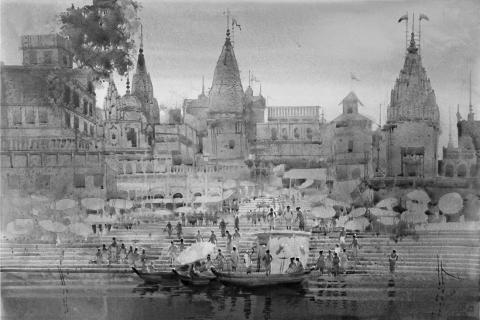
[[{"fid":"10401","view_mode":"default","fields":{"format":"default","alignment":"","field_file_image_alt_text[und][0][value]":false,"field_file_image_title_text[und][0][value]":false},"type":"media","field_deltas":{"1":{"format":"default","alignment":"","field_file_image_alt_text[und][0][value]":false,"field_file_image_title_text[und][0][value]":false}},"attributes":{"class":"media-element file-default","data-delta":"1"}}]]
Chapter 1
King...

When my wife was fast asleep, I slowly transferred my ring onto her finger. Then, telling myself ‘Let me see how clever and refined she turns out to be,’ I left for Ujjayinī the same night, without even informing her. When she woke up the next morning, she realised that I was not there. Then she saw my ring on her finger and thought, ‘He has left me just like he had sworn he would. Now I must fulfil my oath. I see the name ‘Mūladeva’ engraved on...

Once a brāhmaṇa came to him. His hair stood on their ends. The king asked him, ‘Why such hair?’ The brāhmaṇa then started narrating his story–
The Story of Devasvāmī
Deva! In Pāṭalīputra, there lived a brāhmaṇa named Agnisvāmī who was also an agnihotrī. I’m his son Devasvāmī. I married a girl from some distant land. Since she was not mature, she stayed in her father’s place. Once she became attained puberty, I went with my attendant and a horse...

The Story of Candrasvāmī
I am a brāhmaṇa named Candrasvāmī and belong to an agrahāra called Brahmasthala; I have a beautiful wife. Once, when I was away, a kāpālika who had come to my house seeking alms spotted my wife. As soon as the kāpālika saw her, my wife developed fever and passed away that evening. Our relatives gathered and cremated her. Upon my return, I came to know of her passing away and rushed to the crematorium. I noticed the...

The Story of Kusumāyudha
A brāhmaṇa named Devasvāmī lived in Caṇḍapura. He had a beautiful daughter named Kamalalocanā. Kamalalocanā was in love with Kusumāyudha, Devasvāmī’s student. As he wanted to give her hand away to someone else in marriage, Kamalalocanā said to Kusumāyudha, “I’ve chosen you as my husband; take me away somewhere!” He agreed, and one night, he sent her a swift carriage with his attendant. She believed him and got into the...

The Story of Guṇavatī and Candravatī
A king called Guṇasāgara ruled Kaṭāhadvīpa. He begot a daughter named Guṇavatī
Since siddhas had foretold that one day, she would be the queen of the lord of seven islands, king Guṇasāgara concluded that it could only mean that king Vikramāditya was her future husband. So, he sent her with her retinue on a ship to the latter. On the way, however, near Suvarṇa-dvīpa, a huge whale swallowed the ship and...

The Story of Malayavatī
In the city of Ujjayinī lived an artist called Nagarasvāmī. Once every two days, he painted a beautiful portrait of a woman and offered it to king Vikramāditya as a gift. One day he forgot his routine, and by the time he realised it, it was too late. He grew worried about what to do next. At that time, a traveller from a distant land came and gave him a bag made of leather and went on his way. When Nagarasvāmī opened it,...

चन्द्राननार्धदेहाय चन्द्रांशुसितभूतये।
चन्द्रार्कनलनेत्राय चन्द्रार्धशिरसे नमः॥
करेण कुञ्चिताग्रेण लीलयोन्नमितेन यः।
भाति सिद्धीरिव ददत् स पायाद्वो गजाननः ॥
Salutations to Śiva, who has the moon-faced Pārvatī occupying half his body that is smeared with ash resembling the cool rays of the moon and he, who possesses the Sun, the Moon and the Fire as his eyes.
May the Gajamukha, who has his trunk lifted up gracefully, with its...

Padmāvatī-lambaka
देहार्धधृतकान्तोऽपि तपस्वी निर्गुणोऽपि यः।
जगत्स्तुत्यो नमस्तस्मै चित्ररूपाय शंभवे॥
चलत्कर्णाग्रविक्षिप्तगण्डोड्डीनालिमण्डलम्।
धुन्वानं विघ्नसङ्घातमिव विघ्नान्तकं नुमः॥
I bow down to the divine, who has his beloved occupying half his body, but is yet a tapasvī and beyond attributes. I bow down to this amazing form of Śiva, who is adored by the world.
My salutations to Gaṇeśa, the remover of obstacles. By fanning his large...

7. Upon observing his conduct, Sage Kaśyapa expressed his appreciation. He said, “O noble one! There never was an emperor equal to you; when you are seated on the dharmāsana—the seat of justice—you are not swayed by passion, prejudice, or malice. In the past, emperors such as Ṛṣabha were riddled with several flaws and ended up getting destroyed, losing all their wealth. Indra punished Ṛṣabha, Sarvadamana, and Bandhujīvaka for their excessive...
